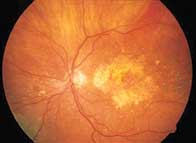 The Royal National Institute of Blind People (RNIB) is urging NICE (the National Institute for Health and Clinical Excellence) in England and Wales to follow the example of Scotland and recommend that Lucentis be made freely available on the NHS to treat age-related macular degeneration (AMD).
The Royal National Institute of Blind People (RNIB) is urging NICE (the National Institute for Health and Clinical Excellence) in England and Wales to follow the example of Scotland and recommend that Lucentis be made freely available on the NHS to treat age-related macular degeneration (AMD).
On Monday the Scottish Medicines Consortium (SMC) recommended that Scottish patients should receive the drug on the NHS, alongside Macugen which it approved last August to treat wet AMD.
In a short statement, the SMC said that Ranibizumab (Lucentis) is now accepted for treatment of neovascular (wet) AMD and the regulator added that the cost implications of this ruling in Scotland would be around £2.4m in year one and rising to £7.1m by year five.
Register now to continue reading
Thank you for visiting Optician Online. Register now to access up to 10 news and opinion articles a month.
Register
Already have an account? Sign in here
